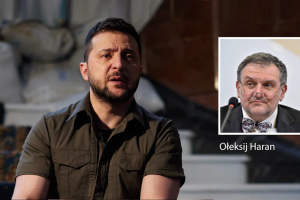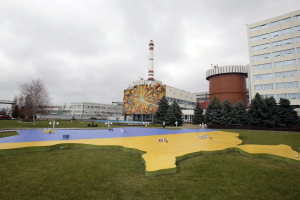Ukraine’s New Government: Possibility of Progress or Another Pre-Term Election in Sight?
Ponars Eurasia
Author(s): Olexiy Haran, Oleksii Sydorchuk

Oleksii Sydorchuk
political analyst at the Ilko Kucheriv Democratic Initiatives Foundation
Two and a half years after the Euromaidan revolution, Ukraine represents a mixed story of improvements and setbacks. In April 2016, a new cabinet was formed under Prime Minister Volodymyr Groysman. So far, it is struggling to meet the expectations both of society and Ukraine’s foreign partners.
The ongoing military conflict in the Donbas aside, popular demand for change remains high across Ukraine. A persistent energy emanates from Ukraine’s pro-European civil society, even while progress on key reforms remains uneven. The high quality of newly-adopted legislation contrasts sharply with its weak implementation.
Although hope is high, trust in political actors continues to fall. While Groysman and President Petro Poroshenko are close, the disintegration of the parliament’s pro-European coalition has significantly reduced their support base, forcing them to work with non-aligned and “oligarchic” members of parliament.
While the political opposition demands another round of pre-term elections, authorities would like to avoid it, arguing that elections would destabilize the country and play into the hands of Vladimir Putin.
New Government, Familiar Practices
Groysman’s ascent to the premiership was preceded by two months of political crisis, triggered by the dissolution of the ruling coalition. Tensions grew high in February after Ukraine’s parliament tried but failed to dismiss the cabinet of Arseniy Yatsenyuk, who had become extremely unpopular. Subsequently, parliamentary factions and groups engaged in wearisome negotiations with Poroshenko and Yatsenyuk on ways to reshuffle the cabinet. Finally, in April, Yatsenyuk announced his resignation. The appointment of 38-year-old Groysman four days later revealed the lasting divisions in parliament: three parties that had defected from the ruling coalition refused to back him. The Petro Poroshenko Bloc and Yatsenyuk’s People’s Front had to turn to non-aligned deputies for support.
Groysman has traditionally been a close ally of Poroshenko. His tenure as parliamentary speaker from November 2014 to April 2016 confirmed his willingness to follow the president’s lead. The relationship between the president and prime minister could be a double-edged sword, however. In Ukraine’s premier-presidential system, both figures share executive power and control certain public policy spheres. The establishment of working relations between the two could prevent a return to the conflict-ridden environment present in post-2005 Ukraine, especially in areas where the constitution does not sufficiently delineate spheres of responsibility. On the other hand, Groysman’s loyalty to Poroshenko risks turning him into a subordinate, undermining any balance of power or accountability to parliament.
So far, the results are mixed. Former prime minister Yatsenyuk has retained some influence over the new cabinet, particularly through Arsen Avakov, the powerful Minister of Interior, and Pavlo Petrenko, Minister of Justice, both members of the Yatsenyuk cabinet and his close allies. At the same time, Groysman has been able to secure some ministerial posts for his own loyalists, demonstrating his ability to retain some independence as a political actor. Although Poroshenko too was able to strengthen his influence on the cabinet by including several new ministers who are personally loyal (such as Minister of Economy Stepan Kubiv and Minister of Finance Oleksandr Danylyuk), Groysman’s cabinet still looks more like a mosaic of different interest groups than a top-down patrimonial pyramid run by Poroshenko.
One can draw some additional conclusions from the quota principle underlying the formation of the new cabinet. Choosing ministers first and foremost according to their political and personal loyalties has downgraded the overall professionalism of the cabinet. At the same time, the compromise-based practice of filling governmental posts might actually ensure the smoother functioning of the cabinet since it means that all key veto players are stakeholders in Ukrainian political life.
Illusions of Coalition
While relations between the president and cabinet are currently calm, damage to the parliament’s relationship with both institutions has not been repaired. Although the parliament installed a new cabinet, a formal ruling coalition is not actually in place. This is because the Petro Poroshenko Bloc and the Popular Front have only 223 deputies together, three short of a simple majority. In order to compensate for this shortcoming, both factions typically enter into situational alliances with independent deputies and, primarily, two non-aligned parliamentary groups, Vidrodzhennia (Renaissance) and Volia Narodu (People’s Will). Although this kind of shadow coalition allows the president and cabinet to pass certain important initiatives, their support comes with a price. The two groups consist mostly of oligarch-friendly MPs: Vidrodzhennia is associated with billionaire and ex-head of the Dnipropetrovsk regional administration Ihor Kolomoiskyi, while Volia Narodu is composed of many former members of the Party of Regions.
Meanwhile, former coalition members Samopomich (de facto led by Lviv mayor Andrii Sadovyi), Batkivshchyna (Yulia Tymoshenko), and the Radical Party of Oleh Lyashko are not consolidating their efforts while trying to distance themselves both from the government and the Opposition Bloc (a parliamentary faction consisting of ex-Party of Regions members). Batkivshchyna and the Radical Party are trying to build parliamentary strategies around opposition to the cabinet’s economic and social policies, especially, of late, a long-anticipated increase in utility prices, and to Poroshenko’s commitment under the “Minsk process” to dealing with Russian proxies in the occupied parts of the Donbas. While both policies are flawed, lately the behavior of Batkivshchyna and the Radical Party has been entirely unconstructive, aimed more toward prompting pre-term parliamentary elections than presenting plausible alternatives. Samopomich, meanwhile, is undergoing an internal crisis as it struggles to find its place as a pro-reformist political force in opposition to the government.
New Efforts in Fighting Corruption
This year, the government has tried to engage in various anti-corruption reforms with limited success. The National Anti-Corruption Bureau and Specialized Anti-Corruption Prosecutor’s Office set their sights on combatting high-ranking corruption, which is perceived by the majority of Ukrainian citizens as the number one needed reform. While these new anti-corruption bodies have been able to target some mid-level officials and take cases to court, their ability to investigate the wrongdoings of senior politicians and civil servants remains limited due to weak coordination with the General Prosecutor’s Office, as well as resistance from unreformed courts. In the most notorious case, anti-corruption prosecutors indicted parliamentary deputy Oleksandr Onyshchenko, who is believed to have embezzled state funds through fake gas company contracts, but he was able to escape the country prior to his arrest.
To reform Ukraine’s notoriously corrupt and politically dependent courts, parliament adopted constitutional changes in June that the president had proposed. The changes were positively assessed by the Venice Commission, the Council of Europe’s legal advisory body, and aim to limit the influence of both the president and parliament on the courts, simplify the organization of the judicial system, and lay a new groundwork for the process of selecting, replacing, and seating judges. In a split parliament, the two-thirds majority vote demonstrated Poroshenko’s ability to maneuver and find the necessary votes, even from among political opponents. However, Ukrainian nongovernmental experts remain cautious about the prospects of the judicial reforms. For example, a separate law on the judiciary which was passed right after the constitutional amendments could compromise the latter’s intended positive effects by preserving a degree of presidential control over the judiciary. There also remains the widespread practice of judges protecting each other within the system.
Reforms to the General Prosecutor’s Office face serious challenges as well. The plan to hire regional prosecutors through open competition became a farce, as nearly all vacant posts were filled with existing prosecutors. The parliament’s dismissal of discredited Prosecutor General Viktor Shokin in March 2016 sent a positive signal to society and the West, but the appointment of his successor, Yuriy Lutsenko, became mired in controversy since parliament made ad hoc legal changes in order to allow him to be appointed given that he lacked the appropriate legal qualifications. At the same time, Lutsenko has so far demonstrated a willingness to act with some independence from the executive branch and has begun to investigate some important overdue cases.
Public Trust Diminished, but not Wasted
Apart from the reform agenda, the stability of the current political regime rests on the attitudes of the Ukrainian population toward their general economic circumstances and the ongoing military conflict in the Donbas. So far in 2016, the level of public trust in all state institutions, except the army, remains low, with the courts and prosecutor’s office faring the worst. Meanwhile, both volunteers and NGOs (together with the army) are generally trusted by the public, reflecting the great potential civil society has in shaping the future of the country. There is a sharp rise of trust in the new police forces, and even state security forces have begun to gain the support of the population.
The electoral attitudes of the population also reflect diminishing trust in the authorities. The ruling parties continue to lose support while opposition forces are struggling to attract disenchanted voters. While people are highly dissatisfied with the current parliament, only 38 percent want pre-term parliamentary elections (47 percent are against). One of the main reasons for this is the absence of clear political alternatives to the existing parties. Several reformist-oriented MPs and civic activists recently announced the creation of two parties[1] that have a liberal ideologies and transparent funding sources, but a lack of cooperation between them may prevent either from challenging the established political forces.
The key factor preventing pre-term parliamentary elections is the unwillingness of both Poroshenko (who has the exclusive right to initiate snap parliamentary elections) and the two ruling parties to advocate for it. Indeed, snap elections would be suicidal for the unpopular People’s Front, and new electoral campaigns would most likely result in an unhealthy confrontation between key political forces and disrupt existing reform efforts. According to poll conducted by the Ilko Kucheriv Democratic Initiatives Foundation in August, a new parliament would still be fragmented, and the formation of a new coalition would be difficult.
While the ruling elites have little to worry about mass popular protest at this time, they should not rest easy. There is continual public dissatisfaction with their activities. In a May 2016 survey, only 26 percent of the population expected the new Groysman cabinet to be effective, although the number is higher than that for the previous cabinet.
Conclusion
Ukraine’s new cabinet is unlikely to significantly change the political trajectory of the country. Improved cooperation between the president and cabinet is offset by fragmentation within parliament. One cannot rule out the possibility that political life may suddenly spiral out of control, even without another pre-term election this year. Reformist efforts are likely to remain halfhearted and driven mostly by Ukrainian civil society and the West. While Ukrainians are significantly dissatisfied with the pace and effects of reforms, their readiness to protest is strongly undermined by fear of instability and the possibility that Russia will capitalize on political turbulence. Preventing bleak scenarios depends on the government’s ability to continue striving down the path of reform and progress, communicate clearly and openly, and deliver visible reform benefits.
Olexiy Haran is Professor and Founding Director of the School of Policy Analysis at the National University of Kyiv-Mohyla Academy.
Oleksii Sydorchuk is a PhD candidate at the National University of Kyiv-Mohyla Academy and Political Analyst at the Ilko Kucheriv Democratic Initiatives Foundation.
[PDF]
[1] The first one, Democratic Alliance, has existed since 2010. In July 2016, three visible public activists and deputies from the Petro Poroshenko Bloc, Mustafa Nayem, Serhiy Leshchenko, and Svitlana Zalishchuk, joined its ranks. The other potential party with the suggested name “The Wave” is considered to be close to Mikheil Saakashvili, the governor of the Odesa region, but it hasn’t been created so far.









